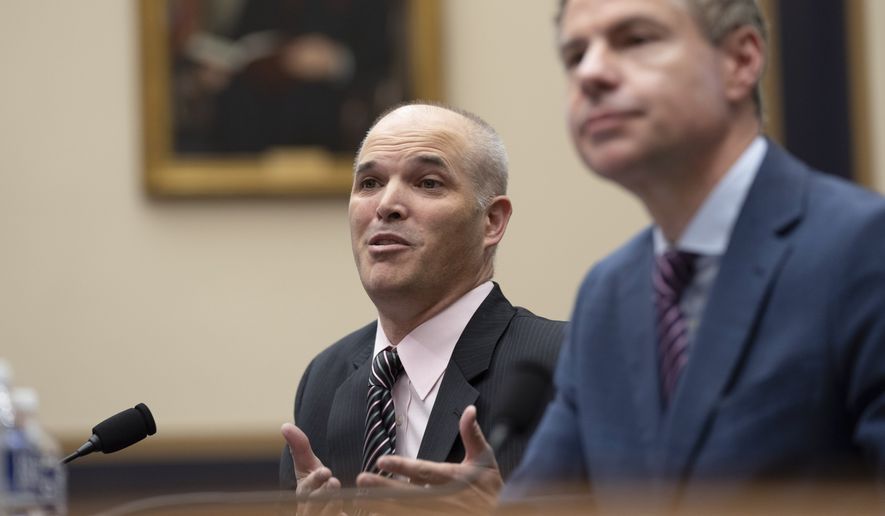The IRS really must have wanted to investigate Matt Taibbi, the Twitter Files journalist.
Records produced to Congress show that the tax agency opened an examination of Mr. Taibbi’s 2018 return last Christmas Eve — a Saturday, no less — according to House Judiciary Committee Chairman Jim Jordan.
The records also show that Mr. Taibbi was able to resolve the tax issue quickly, did not owe the IRS anything and in fact was due a “substantial refund,” Mr. Jordan said Wednesday in a new letter demanding answers from the bureau.
The IRS opened its probe of Mr. Taibbi just three weeks after he published his first Twitter Files account of government officials colluding with Twitter to shut down voices of dissent. Mr. Taibbi, who is far from a conservative journalist, quickly became a hero to the right and deepened a growing rift with those on the political left.
The IRS investigation struck a chord, with the Treasury Department struggling to explain why it sent an agent to make a house call at his home this year on the exact date that he was appearing before Congress to testify on his Twitter Files work.
Mr. Jordan said the IRS has failed to produce key records, but what it has revealed to the committee, with Mr. Taibbi’s assent, is disturbing. Mr. Jordan said an IRS agent assigned to the case did extensive research before the home visit, including looking at his voter registration records, whether he had a concealed weapons permit and whether he had a hunting or fishing license.
“It has been 10 years, to the month, since Lois Lerner disclosed the IRS’ infamous targeting of conservative groups seeking tax-exempt status,” Mr. Jordan wrote in a letter to the IRS on Wednesday. “The circumstances of the IRS’ visit to Mr. Taibbi’s home as he was testifying to Congress about government abuse and censorship raise troubling questions that demand additional information.”
The IRS did not respond to a request for comment.
Treasury Secretary Janet Yellen, testifying to Congress in March, said the visit did sound unusual, adding that such visits would occur only in instances of “lawbreaking.”
“It’s certainly something that I would want to look into,” she said at the time.
Mr. Jordan said in his new letter that far from lawbreaking, it appeared the IRS owed Mr. Taibbi.
“The IRS’ production confirmed one crucial fact — that Mr. Taibbi did not owe the IRS anything,” Mr. Jordan wrote. “Rather, the IRS owed Mr. Taibbi a substantial refund.”
The Ohio Republican said Mr. Taibbi was able to get the matter cleared up on March 21, or less than two weeks after the house call.
According to the records produced to Congress, the IRS said it first inquired about Mr. Taibbi’s 2018 tax return on Oct. 24, 2019. It flagged the return because it met the criteria for possible identity theft.
Mr. Taibbi and his lawyer said they have no record of that letter, nor a 2020 letter.
The IRS did not produce either of the letters to Congress.
The next time the IRS acted was the Christmas Eve decision to open an examination.
Mr. Jordan said the documents provided don’t explain why the IRS decided to renew the matter two years after its last inquiry, nor did the IRS explain the “unusual date” it chose to open the examination.
IRS Commissioner Daniel Werfel told Congress that he couldn’t talk about the specifics of any one case, but said an IRS employee would make a house call only after initial attempts to connect with the taxpayer had failed.
Mr. Taibbi said Christmas Eve was the day he published the ninth account in his Twitter Files reports.
He said the new details “should frighten any journalist — any American citizen, for that matter.”
“When the IRS checks to see if you have a carry permit and visits your home, at a time when they owe you money, it’s time to worry,” he wrote in a new report on Racket News.
The fight over the IRS’ behavior comes as Republicans take aim at the tax agency, saying it has failed to clean itself up from the tea party targeting scandal Ms. Lerner revealed in 2013, when conservative groups were subjected to intrusive scrutiny over applications for tax-exempt status.
Among the offenses the GOP cites are the 2021 leak of confidential information on thousands of taxpayers to ProPublica, which said the data revealed wealthy Americans’ small tax bills.
Congress last year approved legislation pumping $80 billion into the IRS over the next decade to greatly expand audits and collect more taxes that wealthy Americans owe.
Republicans are now battling to claw back that money, arguing it will fuel a reign of terror by the tax agency.
Mr. Werfel says the money will be used to deliver better customer service, make needed upgrades and go after wealthy tax cheats. He said average taxpayers won’t have to worry about increased audit rates for at least several years.
During the Trump administration, it was Democrats complaining about IRS audits after former FBI Director James B. Comey and his deputy, Andrew McCabe, faced audits. They led the FBI’s botched investigation into President Trump.
Critics said the two audits — Mr. Comey’s for 2017 and Mr. McCabe’s in 2019 — seemed too improbable to be a coincidence, but the IRS’ inspector general concluded last year that they were randomly selected.
• Stephen Dinan can be reached at sdinan@washingtontimes.com.




Please read our comment policy before commenting.